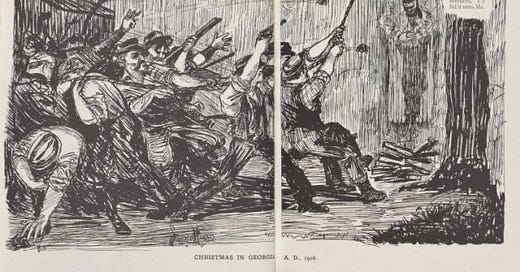In seminary I took a class on the life and theology of Dietrich Bonhoeffer and another on the life and ethics of Martin Luther King, Jr in back-to-back semesters, so their stories have always sat side-by-side for me. Turns out their lives are also parallel.
Both held doctorates of theology, both spent time studying for those doctorates in the American Northeast, and both endured governments specifically set against them and their religious beliefs. They were both uninterested in a religion which was disconnected from the suffering of the world around them. For Bonhoeffer, it was the Jewish people of Europe. For King, it was African Americans (and later all impoverished people) across the United States. They were both surveilled by the government and—eventually—both assassinated; they were thirty-nine at the time of their deaths.
“The sermons that we heard were part poetic oration, part folk wisdom, part celebration. Each was meant to move our bodies and our hearts. Each was meant to make us burn with fire—the fire of the Holy Ghost, that is. We were meant to burn, like lamps in dark places, with our dark faces and beautiful bodies."
-Danté Stewart (Shoutin’ in the Fire: An American Epistle, 104)
A fascinating chapter of Bonhoeffer’s life is the short time he spent worshipping in a Black church in Harlem during the Harlem Renaissance. He had come to New York City as a part of his studies, arriving to spend a year studying at Union Seminary. However, he was far from content. He found the students and professors to not actually be interested in Christianity, sin, or salvation; the churches he visited in his first semester in America were too simple and devoid of depth, of meaning.
But Bonhoeffer made a friend—Albert Franklin Fisher—a black student at Union from Alabama. Albert brought Bonhoeffer to Harlem—removed culturally and geographically from the edifices and theologies of Union and white New York City—and specifically Abyssinian Baptist Church. Reggie L. Williams writes in Bonhoeffer’s Black Jesus,
It was at this church, surrounded by Black bodies, that “the real point of church and Christianity was apparent to Bonhoeffer in the church of the outcasts, where he heard about Jesus as the center of Christian devotion and where Jesus was celebrated ‘with captivating passion and vividness’” (Kindle, 357-358).
Williams argues it was the time spent with this church body, in this spiritual tradition, that gave Bonhoeffer the language and experience of a Jesus who suffers alongside the oppressed. That it was through worshiping in the “‘church of outcasts of America’” that Bonhoeffer was given a vision which ran counter to German nationalism and the Third Reich (370), a vision that led him to speak out for the Jewish people and, ultimately, that led him to a death in solidarity with the captive and in service of Christ.
“‘Problems’ are easier when they are foreign and far away, the sins simpler to hate when they are academic and theoretical.”
-John Archibald (Shaking the Gates of Hell, 26)
John Archibald, in his book about growing up the son of a prominent Methodist minister in the South—Shaking the Gates of Hell— writes of a particular sermon his father gave in 1960, titled “Where is God?” His father opens by naming the horrors occurring around the world: “Katanga, Cuba, Vietnam.” Where was God in the midst of such suffering, such evil? For John—reading the transcript years later—what stands out is the omission.
He writes,
“The real problems were never foreign and far away. They were there in the courthouses that denied Black people the right to vote, there in the pews, where uncomfortable silence apologized for the hate of the Klansmen, who proclaimed it ‘Christian’ to stand against equality for all” (26).
Archibald concludes that it is easier to judge sins across the world for which we are not culpable. Much scarier, much more difficult, is to actually look at the sins, the suffering, the evil in our own backyard for which we may have a hand in causing.
Which brings me back to those two classes. The only difference between them was the location. I took my class on Bonhoeffer at a predominantly white seminary, and I took my class on King forty minutes away at a much more diverse divinity school because my school did not offer such a class. This small difference has become illustrative of a broader thought: I wonder if we—moderate, well-meaning white Christians—are so hesitant to learn from the Black church because we know we will also have to wrestle with our own culpability.
Foreign sin is easier to diagnose, and foreign martyrs are easier to learn from; we aren’t tangled up and on the wrong side of their story.
But King spent his life making the claim that his work was to free both African Americans and white citizens; that both races were in bondage but only one knew about it. What freedom would we discover in submitting to the teaching of the Black church and honestly looking at our own history?
P.S. If you want a great place to start, I compiled a list of good books, documentaries, and movies here.
P.P.S. If you want a great biography of Dietrich Bonhoeffer, please don’t buy a book written by an American. Check this one out instead.



